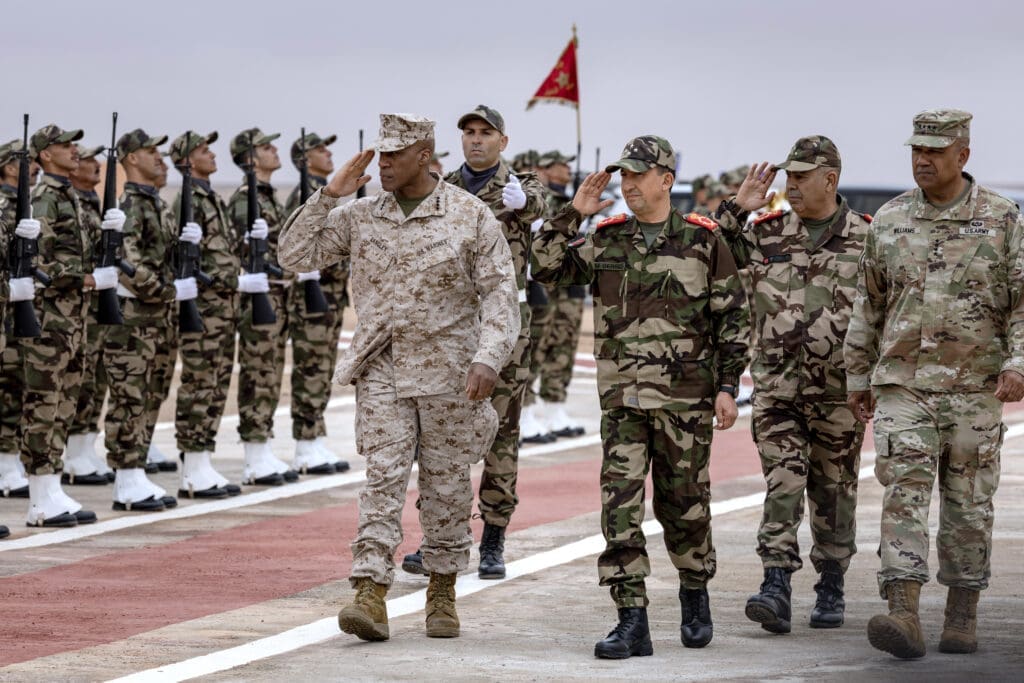Growing tensions between the U.S. and China are having a significant impact on the Maghreb region. While not a frontline theater of confrontation, Morocco, Algeria, Tunisia, Libya and Mauritania are increasingly caught in the crosscurrents of great power competition, with implications in the economic, political, security and technological spheres. In response, they have sought to manage tensions—even leveraging them to gain advantages from both Washington and Beijing. Yet as this rivalry intensifies and governments face growing pressure to pick a side, sustaining such a balancing act will become increasingly challenging.
The U.S.-China rivalry presents opportunities as well as risks. Engaging with Beijing allows countries in the Global South to offset the influence of other major powers, including allies such as the U.S. and former European colonial rulers. While Algeria has close political ties with China, most Maghreb states’ dealings with Beijing are economically driven, bringing infrastructure development to the region while giving Chinese companies somewhere to deploy excess production capacity. All the Maghreb states have joined Beijing’s Belt and Road Initiative (BRI) and signed deals with China, seeking to leverage the latter’s rivalry with the U.S. to maximize aid, investment and diplomatic attention from both powers. Yet this equilibrium is becoming ever more delicate.
Avoiding Exclusive Alignment
The Maghreb states show divergent strategic orientations, but all are affected by the broader recalibration of global power. Algeria has historically favored partnerships with China and Russia, rooted in its anticolonial legacy and tradition of non-alignment. Since 2013, China has been Algeria’s top trade partner; the two countries have deepened cooperation in most sectors. Morocco, on the other hand, maintains a close relationship with the U.S., formalized through a 2006 Free Trade Agreement. Rabat’s strong military ties are exemplified by the 10-year U.S. military cooperation agreement signed with the country in 2020, highlighting the nation’s strategic security partnerships. Yet Morocco has also welcomed Chinese investment, particularly in its key renewable energy and automotive sectors. Tunisia, Libya and Mauritania similarly court multiple partners, seeking to avoid exclusive alignment.
For now, the Maghreb states can leverage their geopolitical relevance to secure diversified partnerships, a form of strategic hedging that maximizes their autonomy and economic gains. However, if the Sino-American rivalry intensifies into a more binary global order, in which partners are forced to choose sides, these countries’ room for maneuver will narrow.
Spheres of Influence
Shortly after President Donald Trump retook office in January, the U.S. and Algeria signed their first ever military cooperation deal. For Washington, this is likely intended to counter the expanding influence of both China and Russia in Africa. For Algeria, the agreement helps counterbalance America’s robust military relationship with Morocco, which includes the provision of military aid, training and participation in regular joint military exercises like the annual U.S.-led African Lion. Tunisia, too, is a significant beneficiary of U.S. security assistance, with a 10-year “Roadmap for Defense Cooperation” signed in October 2020.
Algeria has reasons to be wary of the Trump administration. Shortly before leaving office in 2020, Trump broke with the traditional U.S. policy of supposed neutrality in the Western Sahara conflict by recognizing Morocco’s sovereignty over the region, part of a tradeoff for Morocco’s participation in the Abraham Accords with Israel. The second Trump administration has reiterated this position, prompting Algeria to express its “regret.”
Yet Washington appears to have embraced a new approach to the conflict. In an April interview, Trump’s Senior Advisor for Africa Massad Boulos indicated that Washington is seeking a resolution that reconciles the two state parties to the 50-year-old conflict. The advisor’s emphasis on Algeria’s significance to U.S. interests warrants further examination, as it could suggest dissonance in Washington or a change in policy direction. Regardless, Algeria will remain wary of Trump’s moves, especially given Secretary of State Marco Rubio’s past criticism of Algeria’s defense ties to Russia. Algiers is clearly set to maintain those ties, while also bolstering its military relations with China.
In April, Algiers and Beijing signed 10 major agreements encompassing vital sectors. Yet in accordance with its principles of non-alignment and drive for economic diversification, Algeria has strengthened its economic ties with the U.S., especially in the energy sector. This is reflected in the signing of major contracts with U.S. companies like Occidental, Chevron and Exxon. Algeria is hoping to attract more U.S. investments thanks to its 2022 Investment Law.
Morocco, too, has walked a fine line. Despite its close relationship with the U.S., Rabat has welcomed Chinese investment, particularly in its renewable energy and automotive sectors, and developed stronger trade relations with China.
Tunisia, a major non-NATO ally of the U.S., has developed closer economic ties with China, with which it signed a strategic partnership in May 2024, helping position China as one of Tunisia’s major trading partners. Cash-strapped Tunisia is also likely to seek assistance from Washington. However, the Trump administration could well make such assistance conditional on Tunisia normalizing relations with Israel—a step that populist President Kais Saied appears reluctant to take. If that happens, Tunisia would likely be pushed even further toward Beijing. Indeed, the increasingly authoritarian regime in Tunis may find resonance with China’s political-economic model—even while maintaining its close military and security relations with Washington.
The Trump administration has had minimal direct involvement in Libya, focusing instead on broader regional strategy and counterterrorism efforts. The first Trump administration initially backed the UN-supported Government of National Accord (GNA), yet, in 2019, Trump personally commended the eastern-based military chief Khalifa Haftar, throwing U.S. policy into uncertainty. Libya today remains a fragmented state run by rival governments and marked by persistent conflict, a complex landscape where foreign powers such as Türkiye, Russia and the UAE exert more influence than China or the U.S.
China has maintained a neutral diplomatic position and—like the U.S.—has refrained from becoming deeply involved in Libya’s internal conflicts. Nevertheless, should the political situation in Libya stabilize and energy projects resume, the potential for competition with the U.S. would re-emerge. In such a scenario, Libya could become a focal point for infrastructure diplomacy—particularly if reconstruction starts in earnest—and China would aim to play a significant role.
China’s neutrality notwithstanding, Libya’s rival factions have tended to align with different global blocs, some leaning towards China and Russia while others align with Western countries. In a situation of multipolar stability, China and the U.S. would carefully reinvest in Libya’s reconstruction efforts. The North African country could even benefit from global competition, driving development and infrastructure projects. However, deeper bipolar confrontation could see rival factions in Libya align with different global blocs, leading to proxy conflicts, stalling reconstruction efforts and exacerbating instability. For now, the U.S. will be watchful of security threats emanating from Libya and seek to counter the growing influence of rival powers there, while avoiding deep military or diplomatic entanglements.
Trump’s approach to Mauritania is focused on counterterrorism and a transactional view of foreign aid, with little emphasis on democracy promotion and human rights. The poorest country in the Maghreb, Mauritania is not a major focus for Washington, but its cooperation in counterterrorism aligns with U.S. interests in the unstable Sahel region. To counter Chinese and Russian influence, Trump’s strategy involves supporting U.S. companies to compete with China’s presence in key sectors. Indeed, China is Mauritania’s main trade partner, and their economic cooperation has remained steady despite frequent regime changes in Nouakchott.
U.S. efforts regarding Mauritania are likely to focus on curbing Russia’s military presence and political activity in the country. Yet the U.S. transition from traditional aid to promoting private sector engagement in Africa, by converting grants into loans to stimulate economic growth through private investment, may not be attractive to countries like Mauritania. One key element of the BRI is the construction of ports, connecting countries where China has vested interests and providing a strategic advantage. These ports also aim to promote economic integration across the West African region. Mauritania might face pressure to restrict Chinese involvement in security-related infrastructure or ports, but this could also offer it the chance to secure increased aid and investment from both sides—provided it maintains political stability.
Exercising Agency
The Maghreb states have evolved from passive observers into active participants in the global contest between the U.S. and China. Although they are not central players in the rivalry, their strategic location, abundant resources and infrastructure needs render them increasingly important in global geopolitics.
Thus far, the region’s governments have skillfully balanced these competing interests through strategic hedging. However, as tensions between the U.S. and China become more confrontational and rigid, the Maghreb may face mounting pressure to align its economic and technological interests with one power or the other. Decisions by African governments to open markets to Chinese telecoms firm Huawei show that persistent U.S. efforts to dissuade them from collaborating with it and other Chinese firms have largely been ignored. Yet projects incorporating Huawei’s 5G infrastructure in Algeria or Tunisia may encounter future limitations; U.S. sanctions on Chinese companies could discourage Western firms from engaging in joint ventures with them.
To maintain their strategic autonomy, Maghreb states must focus on diversifying their partnerships, strengthening regional cooperation and investing in institutional capacity to effectively manage foreign influence. The key to thriving amid global competition lies in exercising agency—capitalizing on opportunities without compromising sovereignty.


